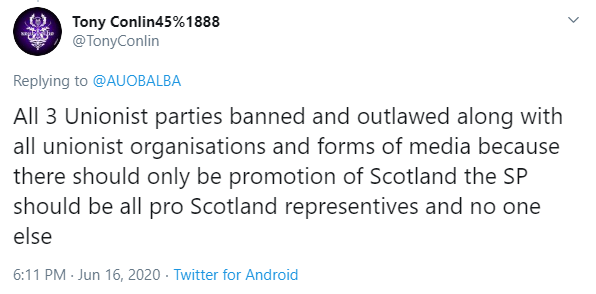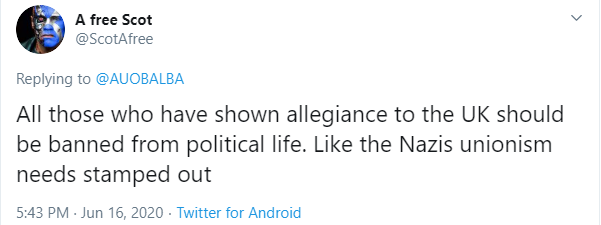Scotland has a Justice Minister with no experience of the law, beyond a conviction for driving without insurance. Perhaps this is why he is introducing a bitterly contested bill to ban and to criminalise ‘hate speech’, especially speech that is incitement to hatred, in people’s homes. There is also a convoluted plan to criminalise playwrights and perhaps also actors performing in plays where Mr Yousaf deems the text to be likely to incite hatred.
The scriptwriter Jonny Speight would, no doubt, have been firmly in his sights for his creation, Alf Garnett, even though this character was a satirical construct. Of course no reasonable person wants to hear ‘hate speech’ in the public or private domains. But criminalising what is said in people’s homes is a step too far.
Mr Yousaf is, however, defending his law and denying the ‘free speech’ defence. I am not clear whether there is a watertight definition in this bill of what constitutes ‘hate speech’, but it appears to mean something that offends another person. I would be interested to know whether promoting the satirical magazine Charlie Hebdo, whose publishers have been lethally attacked for reproducing images of the prophet Mohammed, would count as ‘hate speech’ under this law. In a democratic polity, no-one has an inalienable right not to be offended.
In a democratic polity, no-one has an inalienable right not to be offended.
This bill has been criticised by organisations representing broad sections of society, including the Roman Catholic Church and the Secular Society, groups that would normally be on opposing sides of an issue. The Scottish Police Federation, too, opposes the bill. Its members would be in the front line of enforcing it, and that would be an uncomfortable place to be.
There is little in the bill that is not already covered in existing legislation, apart from the intrusion into people’s homes. It is, of course, already permissible to arrest people for criminal acts at home, such as assault or downloading images of child sexual abuse. But the criminalisation of speech in the home is another matter. It goes beyond the ill-conceived and now repealed Offensive Behaviour at Football Act, and it returns us to some of the kinds of argument that bedevilled the SNP’s attempt to impose a Named Person on every child – another intrusion into family life.
Quite how Yousaf intends to police conversations in the home is not vouchsafed to us. Perhaps family members and guests are to be interrogated about what they have discussed in random checks of households. Or perhaps there will be particular attention paid to the households of those suspected of having views that do not accord with the world view of the regime in power. It would be difficult, at first at least, to have the kind of surveillance that used to happen in Soviet eastern Europe.
When Vaclav Havel, the dissident playwright and later first President of post-Soviet Czechoslovakia was persona non grata in the 1970s under the Husak communist regime, he was either imprisoned or, when at liberty, constantly followed and harassed by not very secret agents of the secret police.
In the former German Democratic Republic, about one person in fifty was an agent of the Stasi, the secret police. Dissidents were under surveillance, sometimes by long lens cameras set up in a flat opposite their own. The paranoia of that surveillance society is expertly depicted in the 2007 film, “The Lives Of Others”. The monstrous extent of Stasi monitoring of the East German public became known only after the fall of the Berlin wall in 1989. They even had a collection of sealed jars containing dusters that had wiped the seats used by subjects of interrogation, to be produced for sniffer dogs to identify or track down these subjects subsequently.
This Scottish legislation is, however, incongruous given Mr Yousaf’s own record and that of his party and its supporters. He is the man who stood in the Scottish parliament this year and accused Scotland of having ‘a problem with structural racism’. He complained about there having been only four MSPs from a minority ethnic background out of some 300 who have sat at Holyrood.
Yet that is not disproportionate when 96 per cent of Scots are white – something he omitted to mention as he kept spitting out the word ‘white’ in the chamber, as if it were a swear word. His diatribe was ripe for satire, with the alternative version showing him complaining about the white cross on the saltire and the SNP’s White Paper of 2013. But perhaps that satire, too, would be classed as ‘hate speech’ in our brave new Scotland.
The hate speech that is most evident in Scotland is that directed by supporters of Mr Yousaf’s own party, the SNP, at those who disagree with it about Scotland’s future. How would he deal with the author of this tweet from 3 April 2017:
Unionist supporters who would still vote no in a Scottish independence referendum should be gassed like Jews #Referendum #ScotRef
Many are more on the level of the tweet by the journalist, Ruth Wishart – deeply unpleasant and plain wrong, but not violent:
Further tweets demonstrate nationalists’ cavalier attitude to freedom of opinion. From 16 June 2020:

On the same day, there was also this:

If Mr Yousaf wants to criminalise ‘hatred’, we are on a steep and slippery slope into legalised intolerance. Hatred can derive from ignorance, bigotry, misinformation. It can, as I have shown, be exemplified in different ways. It can be ugly and disfiguring. Incitement to hatred can be ugly and frightening. But should hatred itself be criminalised?
Incitement to violence should probably be subject to legal sanctions. But Mr Yousaf should be aware that if incitement to hatred itself is criminalised, he could end up with large numbers of Scottish nationalists in the courts.
Help us fight back
If you can, please pledge a monthly donation so that we can grow and be an even stronger voice against the ugly Nationalism that has engulfed Scotland. Thank you.





There is an important psychological sub-plot to all of this – arguably it is the main plot. The SNP are a bunch of “haters”, as Nicola Sturgeon has confessed herself to be. She admitted to Mandy Rhodes, in a book called “Scottish National Party Leaders” (2016), that hatred has been “the motivation for my entire political career” (p. 358). This is an essentially negative position, and it springs from a psychological rather than a political root. It is that which gives the venom of their own self-hatred (psychological self-harm) which is taken out on “the helpless other” (like kicking the… Read more »